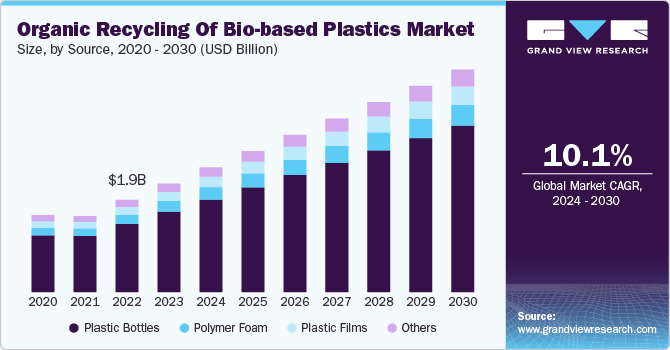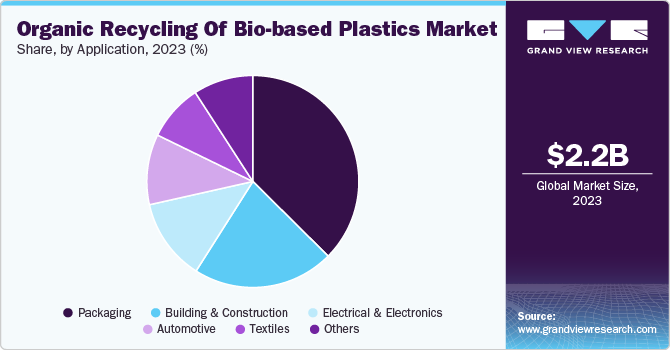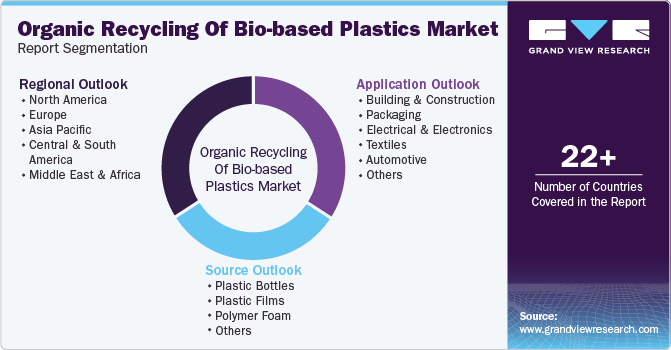
Organic Recycling of Bio-based Plastics Market Size, Share & Trends Analysis Report By Source (Plastic Bottles, Plastic Films), By Application (Building & Construction, Packaging), By Region, And Segment Forecasts, 2024 - 2030
- Report ID: GVR-4-68040-477-6
- Number of Report Pages: 110
- Format: PDF, Horizon Databook
- Historical Range: 2018 - 2022
- Forecast Period: 2024 - 2030
- Industry: Bulk Chemicals
Market Size & Trends
The global organic recycling of bio-based plastics market size was estimated at USD 2.20 billion in 2023 and is projected to grow at a CAGR of 10.1% from 2024 to 2030. The increasing awareness of environmental issues among consumers and businesses is driving the demand for organic recycling of bio-based plastics.

The market is witnessing an increased focus on sustainability from industries and consumers. Companies are now prioritizing eco-friendly solutions, driven by stricter environmental regulations and rising consumer awareness about plastic waste. With bio-based plastics being biodegradable or compostable, there is a growing trend toward adopting these materials in packaging, consumer goods, and agriculture. This shift is further supported by technological innovations that enhance the recyclability and performance of bio-based plastics, pushing demand across various sectors.
Drivers, Opportunities & Restraints
The growing emphasis on reducing the environmental impact of traditional plastic waste is driving the market growth. Governments globally are implementing stringent regulations to limit single-use plastics, with policies that incentivize the production and use of biodegradable materials. Bio-based plastics provide a renewable alternative, helping reduce reliance on fossil fuels while addressing waste disposal challenges. Moreover, industries are facing mounting pressure to reduce their carbon footprint, driving the shift towards sustainable plastic solutions and organic recycling processes.
The organic recycling of bio-based plastics presents a significant growth opportunity in the packaging industry, especially in the food and beverage sectors. With consumers demanding more sustainable packaging options, companies that invest in compostable and biodegradable bio-based plastics can gain a competitive advantage. The development of advanced recycling technologies that improve the efficiency of processing bio-based plastics further opens avenues for scaling operations, reducing costs, and expanding into new markets, including agriculture, retail, and healthcare, where eco-friendly packaging solutions are increasingly valued.
Despite the promising outlook, the market faces challenges due to the high costs and complexity associated with recycling processes. Bio-based plastics are generally more expensive than traditional plastics, and the infrastructure for large-scale organic recycling is still limited. In addition, the lack of widespread consumer awareness and proper disposal systems hinders the effective collection and recycling of these materials. This combination of higher costs and limited infrastructure presents a barrier to the mass adoption of bio-based plastics, particularly in price-sensitive markets.
Source Insights
Based on source, the plastic bottles segment led the market with a revenue share of 74.14% in 2023, owing to the increasing shift toward circular economy practices. This shift is considered a major growth driver for the plastic bottles segment. Beverage and personal care industries are under growing pressure to reduce plastic waste and adopt sustainable packaging solutions. Bio-based plastic bottles, which are biodegradable or compostable, provide a viable solution that aligns with corporate sustainability goals.
The plastic films segment is expected to grow at a significant rate over the forecast period. The segment is driven by the rising demand for eco-friendly packaging solutions. Industries such as food packaging, agriculture, and retail are increasingly turning to bio-based plastic films due to their biodegradability and lower environmental impact. As consumer awareness around plastic pollution grows, companies are under pressure to reduce single-use plastic waste, prompting a shift toward sustainable alternatives.
Application Insights
The packaging segment dominated the market with the largest revenue share of 37.43% in 2023, driven bythe growing consumer demand for sustainable packaging. As consumers become more environmentally conscious, brands are under increasing pressure to offer eco-friendly packaging solutions that reduce waste and carbon footprints. Bio-based plastics, which can be organically recycled, provide an appealing alternative to conventional plastics, especially in sectors like food, beverages, and personal care.

The energy & power segment is poised to grow at a significant CAGR from 2024 to 2030. This can be attributed to the increasing emphasis on sustainable building materials. With governments and industry stakeholders prioritizing eco-friendly construction practices, bio-based plastics are gaining traction due to their renewable origins and ability to be organically recycled. These materials can be used in various construction applications such as insulation, flooring, and piping, offering both durability and a lower environmental impact compared to traditional plastics. In addition, as green building certifications, like LEED and BREEAM, encourage the use of sustainable materials, bio-based plastics are becoming a preferred choice for construction projects aiming to meet stricter environmental standards. This growing focus on sustainability within the construction industry is driving the adoption and recycling of bio-based plastics in building applications.
Regional Insights
The organic recycling of bio-based plastics market in North America is primarily driven by stringent environmental regulations and corporate sustainability initiatives. Governments are enforcing stricter guidelines to reduce plastic waste, particularly single-use plastics, which has led to an increased focus on biodegradable and compostable alternatives. Industries like food and beverage, consumer goods, and agriculture are actively seeking bio-based plastic solutions to align with these regulations. The strong presence of recycling infrastructure and technological innovations in the region is also accelerating the adoption of bio-based plastics that can be organically recycled, particularly in Canada and Mexico, where sustainability goals are being prioritized.
U.S. Organic Recycling of Bio-based Plastics Market Trends
The organic recycling of bio-based plastics market in the U.S. is largely fueled by the rise in corporate responsibility and consumer demand for sustainable products. Major industries, including packaging, retail, and automotive, are increasingly adopting bio-based plastics to meet eco-conscious consumer expectations and comply with federal and state-level environmental policies. The U.S. government’s push toward reducing carbon emissions and minimizing plastic waste in landfills is driving investments in bio-based materials and organic recycling technologies.
Europe Organic Recycling of Bio-based Plastics Market Trends
The organic recycling of bio-based plastics market in Europe accounted for the largest global revenue share of 34.11% in 2023. Europe is at the forefront of the global market, driven by the European Union’s aggressive policies on sustainability and circular economy practices. The EU’s Single-Use Plastics Directive and the Green Deal are creating a regulatory landscape that heavily incentivizes the use of biodegradable and bio-based plastics. In addition, strong consumer demand for sustainable packaging and products across sectors like food, agriculture, and personal care is pushing industries to adopt bio-based alternatives that can be organically recycled. European countries are also leading in composting and recycling infrastructure, further supporting the growth of this market.
The organic recycling of bio-based plastics market in Germany is driven by the country’s commitment to environmental innovation and circular economy principles. Germany’s leadership in green technologies, along with strong government policies promoting the reduction of plastic waste, is encouraging industries to adopt bio-based plastics. The packaging and automotive sectors, in particular, are under pressure to use sustainable materials that align with Germany’s ambitious climate targets.
Asia Pacific Organic Recycling of Bio-based Plastics Market Trends
The organic recycling of bio-based plastics market in Asia Pacific is driven by rapid industrialization, urbanization, and an increasing awareness of environmental sustainability. Countries like China, India, and Japan are facing significant plastic waste management challenges, prompting governments and corporations to invest in eco-friendly alternatives. Policies supporting the use of biodegradable materials, coupled with the region’s large manufacturing base, are fostering demand for bio-based plastics that can be organically recycled.
Key Organic Recycling of Bio-based Plastics Company Insights
The organic recycling of the bio-based plastics industry is highly competitive, with several key players dominating the landscape. Major companies include NatureWorks LLC, Novamont S.p.A., BASF, Total Corbion PLA, Braskem S.A., Danimer Scientific, Biome Bioplastics Ltd., FKuR Kunststoff GmbH, Bio-on S.p.A., and Bioplastics Recycling GmbH. The market is characterized by a competitive landscape with several key players driving innovation and market growth. Major companies in this sector are investing heavily in research and development to enhance the performance, cost-effectiveness, and sustainability of their products. Some of the prominent players in the global organic recycling of bio-based plastics market include:
Key Organic Recycling of Bio-based Plastics Companies:
The following are the leading companies in the organic recycling of bio-based plastics market. These companies collectively hold the largest market share and dictate industry trends.
- NatureWorks LLC
- Novamont S.p.A.
- BASF
- Total Corbion PLA
- Braskem S.A.
- Danimer Scientific
- Biome Bioplastics Ltd.
- FKuR Kunststoff GmbH
- Bio-on S.p.A.
- Bioplastics Recycling GmbH
Recent Developments
-
In August 2024, Honeywell and Hinergy launched a new advanced plastic recycling program aimed at enhancing sustainability in the plastics industry. This initiative focuses on converting waste plastics into valuable resources, thereby reducing environmental impact. The collaboration will utilize Honeywell's recycling technology to process various types of plastic waste, making it easier to recycle materials that are typically difficult to process.
-
In July 2022, Dow and Mura Technology announced a significant partnership aimed at scaling the advanced recycling of plastics, marking the largest commitment of its kind in the industry. The collaboration plans to establish multiple recycling facilities in the U.S. and Europe, with a target to add up to 600 kilotons of recycling capacity by 2030.
Organic Recycling of Bio-based Plastics Market Report Scope
|
Report Attribute |
Details |
|
Market size value in 2024 |
USD 2.53 billion |
|
Revenue forecast in 2030 |
USD 4.51 billion |
|
Growth rate |
CAGR of 10.1% from 2024 to 2030 |
|
Historical data |
2018 - 2022 |
|
Base Year |
2023 |
|
Forecast period |
2024 - 2030 |
|
Quantitative units |
Revenue in USD million/billion, Volume in Kilotons, and CAGR from 2024 to 2030 |
|
Report coverage |
Revenue forecast, competitive landscape, growth factors, and trends |
|
Segments covered |
Source, application, region |
|
Regional scope |
North America; Europe; Asia Pacific; Central & South America; Middle East & Africa |
|
U.S.; Canada; Mexico; UK; Germany; France; Italy; Spain, Denmark, Sweden, Norway, China; India; Japan; Thailand, South Korea; Brazil; Argentina; Saudi Arabia; South Africa; UAE |
|
|
Key companies profiled |
NatureWorks LLC; Novamont S.p.A.; BASF; Total Corbion PLA; Braskem S.A.; Danimer Scientific; Biome Bioplastics Ltd.; FKuR Kunststoff GmbH; Bio-on S.p.A.; Bioplastics Recycling GmbH |
|
Customization scope |
Free report customization (equivalent up to 8 analyst working days) with purchase. Addition or alteration to country, regional & segment scope |
|
Pricing and purchase options |
Avail customized purchase options to meet your exact research needs. Explore purchase options |
Global Organic Recycling of Bio-based Plastics Market Report Segmentation
This report forecasts revenue growth at global, regional, and country levels and provides an analysis of the latest industry trends in each of the sub-segments from 2018 to 2030. For this study, Grand View Research has segmented the global organic recycling of bio-based plastics market report based on source, application, and region:

-
Source Outlook (Volume, Kilotons; Revenue, USD Million, 2018 - 2030)
-
Plastic Bottles
-
Plastic Films
-
Polymer Foam
-
Others
-
-
Application Outlook (Volume, Kilotons; Revenue, USD Million, 2018 - 2030)
-
Building & Construction
-
Packaging
-
Electrical & Electronics
-
Textiles
-
Automotive
-
Others
-
-
Regional Outlook (Volume, Kilotons; Revenue, USD Million, 2018 - 2030)
-
North America
-
U.S.
-
Canada
-
Mexico
-
-
Europe
-
UK
-
Germany
-
France
-
Italy
-
Spain
-
Denmark
-
Sweden
-
Norway
-
-
Asia Pacific
-
China
-
India
-
Japan
-
Thailand
-
South Korea
-
-
Central & South America
-
Brazil
-
Argentina
-
-
Middle East & Africa
-
South Africa
-
Saudi Arabia
-
UAE
-
-
Frequently Asked Questions About This Report
b. The global organic recycling of bio-based plastics market was estimated at USD 2.20 billion in 2023 and is expected to reach USD 2.53 billion in 2024
b. The global organic recycling of bio-based plastics market is expected to grow at a compound annual growth rate of 10.1% from 2024 to 2030 to reach USD 4.51 billion by 2030
b. Europe dominated the global organic recycling of bio-based plastics market and accounted for largest revenue share of 34.11% in 2023. Europe is at the forefront of the organic recycling of bio-based plastics market, driven by the European Union’s aggressive policies on sustainability and circular economy practices.
b. Some key players operating in the organic recycling of bio-based plastics market include NatureWorks LLC, Novamont S.p.A., BASF, Total Corbion PLA, Braskem S.A., Danimer Scientific, Biome Bioplastics Ltd., FKuR Kunststoff GmbH, Bio-on S.p.A., and Bioplastics Recycling GmbH
b. The increasing awareness of environmental issues among consumers and businesses is driving the demand for organic recycling of bio-based plastics.
We are committed towards customer satisfaction, and quality service.
"The quality of research they have done for us has been excellent."




